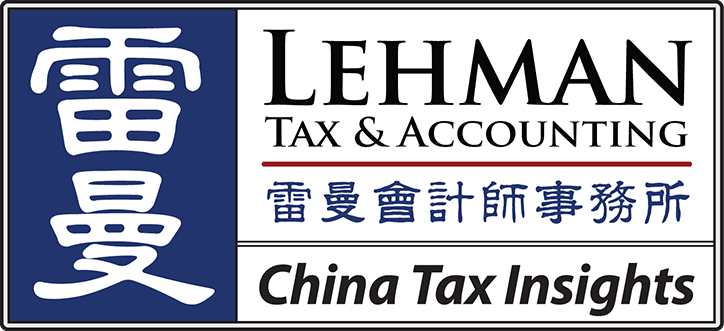

|
|
|
|
LEHMAN, LEE & XU
|
|
June 2010
|
|
|
| Terminating Employees in China: Tax Implications |
|
Tax Implications: Employee Economic compensation received in relation to termination of employment,
either by the employer or employee, is taxable as a part of the employment
income. In considering that the amount received could be relatively
significant and the employee may not receive any fixed wages and salaries
in the near future, such an amount could be spread over a period of
no more than 12 months for PRC Individual Income Tax ("IIT")
purposes. For the economic compensation received by an employee due to the termination
of the employment contract by the employer in view of the corporate
restructure or the layoff policy for State-owned enterprises, the amount
could be taxed under the spread over method up to 12 months. In addition,
if the compensation is lower than 300% of the local average annual salary
of the previous year, the PRC IIT could be exempted under the current
PRC regulations. The position towards the spread-over treatment and the tax exemption
amount varies from city to city and clients are advised to check with
their local tax bureaus to determine local practices. Not all costs and expenses incurred by PRC enterprises are deductible.
Only reasonable expenses and related expenses incurred in the ordinary
course of business for production of income and not prohibited under
the PRC Enterprise Income Tax Law ("EIT Law") are tax-deductible. Under the current PRC EIT Law, all reasonable staff termination expenses incurred by the company are 100% tax-deductible for EIT purpose. Employers Filing and Withholding Responsibilities Similar to the regular salaries and wages, an employer is responsible
to withhold the IIT liabilities and perform the PRC monthly IIT withholding
filing on its employees for all termination-related payments. In addition,
pursuant to the Administrative Law of the People's Republic of China
on the Levying and Collection of Taxes (revised in 2001), if an employer
fail to perform its withholding responsibility, the tax bureau will
collect the overdue tax from the taxpayer directly. However, it may
impose late filing penalties of 0.5-3 times of the tax overdue on the
withholding agent, ie the employer. If an employer does not file the employees' information to the tax bureau and this is found out by the tax bureau, the amount paid to the individuals may not be considered as a tax-deductible item for EIT purposes. |
|
|
| Xinjiang Province: Resource tax revamp soon |
|
China is planning to alter the taxation structure on the profits that companies make from energy products on a trial basis in Xinjiang. It has been suggested that the prices of resource products should be taken into consideration when levying the taxes, rather than the existing system that takes into account the actual output. There have been no indications as to what the tax rate would be. Analysts are, however, of the view that it may be 3-5 percent for resource products like oil. While the resource tax may not be implemented throughout all of China for another two or three years, the new tax is expected to be implemented next year.
|
| China to More Strictly Enforce Land Appreciation Taxes |
|
China will collect house- and land-price appreciation
taxes more "strictly." New State Administration of Taxation
circular signals more robust tax-collection after four years of relaxed
tax-rules imposition. Strict collection of land appreciation tax will
to some extent curb the windfalls of property developers by reducing the
profits of developers. The Chinese government is working hard to rein
in soaring home prices after they rose by a record 11.7 percent in March
this year.
|
| China scraps export tax rebates on 406 products |
|
China's State Council has approved the scrapping
of export tax rebates on 406 products, effective July 15. The products
included some steel and non-ferrous metals products, fertilizers, as well
as some plastic, rubber and glass products. The new measure are seen to
discourage exports of energy-intensive products in line with the government's
intention to adjust industrial structures and cut pollution.
|
|
|
| Newsbites | |
|
Leaders of SAT Meet National
Advanced Workers in the Taxation System
|
Third Protocol on the Arrangements
of Avoidance of Double Taxation Between Chinese Mainland and Hong Kong
SAR Signed in Beijing
|
|
Agreement and Protocol on the
Avoidance of Double Taxation between China and Finland Signed in Beijing
|
China to provide subsidies for
tech exports
|
|
Tax system hampering service
sector growth
|
Rebate removal to be hard on
steel mills
|
|
Strengthen Tax Collection And
Administration On Industries With ˇ®Two highs' And Production Overcapacity
|
Preferential Policies Confirmed
For Transitional Period For Enterprise Income Tax
|
|
China scraps export tax rebates
on 406 products
|
Two Night Clubs In Shenzhen
Exposed For Tax Evasion Of More Than 100 Million Renminbi
|
|
Shanghai Expo Bureau Reduces
Business Tax For Food And Drink Dealers Inside the Expo Site
|
Axing of resource tax proposed
|
|
US sets preliminary penalties
on Chinese drill pipe
|
Property-tax reforms put on
agenda
|
|
Property tax may be levied
|
Economic zone receives nod
for expansion
|
|
|
|
|